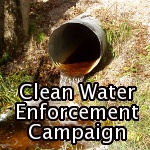Article from Stockton Record.
http://www.recordnet.com/apps/pbcs.dll/article?AID=/20140519/A_NEWS/405190317
By Alex Breitler, Record Staff Writer
May 19, 2014 12:00 AM
STOCKTON – City streets and waterways might smell a bit fresher these days.
Officials report fewer sewage spills since an environmental group’s lawsuit forced Stockton to address that chronic problem.
In the five years since the litigation, the city stepped up inspections and repairs to its aging pipes, and the number of spills declined to 133 last year from 194 in 2009.
Not that the work is finished.
An agreement stemming from the lawsuit requires the city to meet increasingly stringent goals, and Stockton failed to comply last year.
That led to new discussions with the environmental group and a new amended agreement, which is expected to be considered by the City Council in June, said Ba Than, deputy director of Stockton’s Municipal Utilities Department.
Among other things, the city would be given more time to further reduce the number of spills, Than said, with the new agreement extending to the end of 2015.
“With more time to clean up we probably would make it,” Than said. “We’re getting better and better every year.”
And that’s what counts, said Bill Jennings, whose California Sportfishing Protection Alliance sued not only Stockton but also Modesto and Sacramento, alleging an excessive number of spills.
“Stockton told us (about last year’s violation),” Jennings said. “They were candid. We made some adjustments, and I think we’re happy with it. Basically, this is about getting Stockton on the path toward progress, and things have gotten better. Is it where it should be? Well, no, but we’re getting there.”
The lawsuit filed by Jennings’ group claimed that 1,530 sewer overflows in Stockton during the previous five years endangered human health and the environment.
The criticism focused on the combined 1,400 miles of main sewer lines and the city-owned portion of lateral connections from homes. Sewage spilled from those pipes can run off into city streets and enter storm drains that feed the Delta.
The city agreed to a number of measures as part of the original $4 million settlement, including inspecting grease traps at restaurants and using closed-circuit television systems to inspect sewer lines.
Ultimately, the goal is to achieve about 5 spills per 100 miles of pipe – still higher than the state average of less than 3 spills per 100 miles, Than said, but a big improvement from the city’s goal five years ago of 24 spills per 100 miles.
So far Stockton is on pace for meeting this year’s target, Than said, and residents can keep it that way by not pouring grease down their drains – a bad habit that often causes a spike in spills around the holidays.
The city has also recently emphasized the need to report spills quickly, to stop them when they’re small. In one extreme case, a resident waited 17 days before reporting a spill even though the resident saw and smelled the spill running off into the street, Than said.
Just last week, more than 1,000 gallons reportedly spilled into the Deep Water Channel because it took more than three hours for a private business to report the incident, he said.
“We could have had a crew out there in 10 or 15 minutes and stopped the problem,” Than said.









